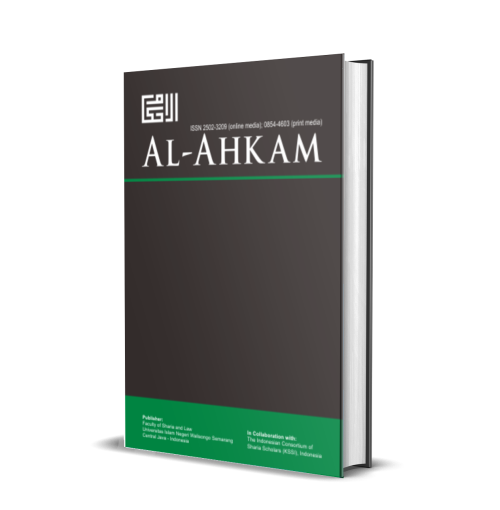NUSHŪZ SUAMI-ISTRI DAN SOLUSINYA: Studi Tafsīr al-Rāzī
DOI:
https://doi.org/10.21580/ahkam.2016.26.1.710Keywords:
nushūz, suami, istri, Tafsīr al-RāzīAbstract
Nushūz means a wife do anything against her husband for no reason that can be accepted by Islamic law (wife nushūz), or husband does not carry out its obligations as stipulated in Islamic law (husband nushūz). This article intends to analyze the concept of nushūz according to Islamic law in the perspective of Fakhr al-Dīn al- Rāzī in his Qur’anic commentary (tafsīr). It also discussed about the solutions of nushūz according to the Qur’an. Based on the study of sura al-Nisa verse: 34, 35, and 128 that nushūz can be done even by the wife or the husband. When problems of nushūz already potentially shiqāq, it is advisable to appoint a ḥakam (mediator), both from husband’s families and wife's families.
Nushūz berarti seorang istri melakukan perbuatan yang menentang suami tanpa alasan yang dapat diterima oleh hukum Islam, atau sebaiknya suami tidak menjalankan kewajibannya sebagaimana ketentuan hukum Islam. Artikel ini bermaksud untuk menganalisis konsep nushūz menurut hukum Islam dalam perspektif Fakhr al-Dīn al-Rāzī dalam kitab tafsirnya. Selain itu juga dibahas tentang bagaimana tawaran solusi nushūz menurut al-Qur’an berdasarkan kajian terhadap surat al-Nisā’ ayat 34, 35, dan 128 bahwa nushūz bisa dilakukan oleh istri maupun suami. Ketika permasalahan nushūz
sudah mengkhawatirkan sehingga berpotensi shiqāq, maka dianjurkan untuk mengangkat seorang ḥakam (mediator), baik dari keluarga suami maupun keluarga istri.
Downloads
References
Abū al-Yaqẓan, Dirāsāt fī ‘l-Tafsīr wa Rijālih, t.t.p: t. p, t.th.
al-Dawūdī, Tabaqāt al-Mufassirīn, Beirut: Dār al-‘Ilmiyyah, t.th.
al-Dhahabī, Muḥammad Ḥusayn, Al-Tafsīr wa ‘l-Mufassirūn, juz I, Beirut: Dār al-Iḥyā’ al-Turāth al-’Arabī, t.th.
Faudah, Mahmud Basuni, Tafsir-Tafsir al-Qur’an: Perkenalan dengan Metodologi Tafsir, Bandung: Pustaka, 1987.
Ibn Manzūr, Lisān al-‘Arab, Beirut: Dār al-Ma’ārif, 1981.
Munawwir, Achmad Warson, al-Munawwir, Yogyakarta: Pustaka Progresif, 1997.
al-Qurṭubī, Jāmi' al-Aḥkām al-Qur'ān, juz III, Mesir: Dār al-Kitāb al-'Arabī, 1967.
al-Rāzī, Fakhr al-Dīn, al-Tafsīr al-Kabīr, juz V, Beirut: Dār al-Kutub al-‘Ilmiyyah, 1990.
al-Ṣābūnī, Muḥammad 'Alī, Rawāi’ al-Bayān, Tafsīr Āyāt al-Aḥkām min al-Qur'ān, juz I, Jakarta: Dār al-Kutub al-Islāmiyyah, 2001.
al-Saldani, Saleh bin Ganim, Nushūz, alih bahasa A. Syauqi Qadri, cet. VI, Jakarta: Gema Insani Press, 2004.
Kompilasi Hukum Islam.
Sanusi, Nur Taufiq, Fikih Rumah Tangga Perspektif Al-Qur’an dalam Mengelola Konflik Menjadi Harmoni, Tangerang: eLSAS, 2011.
Sha’rawī, Mutawallī, Tafsīr Sha’rawī, Medan: Duta Azhar, 2006.
Shihab, M. Quraish, Tafsir al-Misbah, Volume 7, Jakarta: Lentera Hati, 2002.
al-Ṭabarī, Abū Ja’far Muḥammad ibn Jarīr, Jāmi’ al-Bayān ‘an Ta’wīl al-Qur’ān, Beirut: Dār al-Fikr, 1988.
Tihami, H.M.A., & Sohari Sahrani, Fikih Munakahat, Jakarta: Rajawali Press, 2009.
‘Umar, Nasaruddin, Argumen Kesetaraan Jender Perspektif al-Qur'an, Jakarta: Paramadina, 1999.
Downloads
Published
How to Cite
Issue
Section
License
By submitting an article to the journal, the author(s) agree to transfer the published article's copyright to the journal, which will act as the publisher. This means the journal will have the right to publish the article in various forms, including reprints. The journal will maintain the publishing rights to the published articles.
In line with the license, authors and third parties (readers, researchers, and others) are allowed to share and adapt the material. In addition, the material must be given appropriate credit, provided with a link to the license, and indicated if changes were made. If authors remix, transform or build upon the material, authors must distribute their contributions under the same license as the original.




